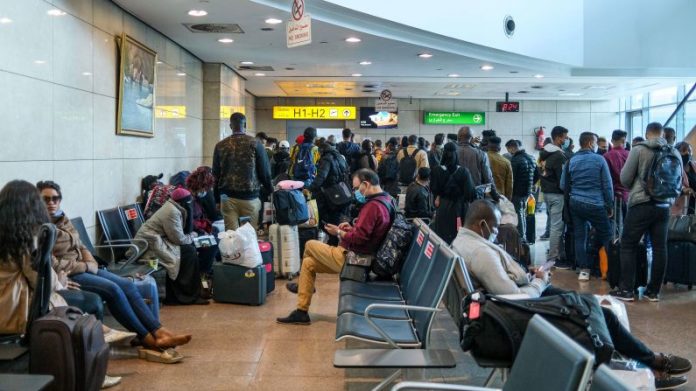A widespread global information technology system outage on Friday caused chaos at airports worldwide, including Nigeria’s Murtala Muhammed International Airport, where flights from Lagos to the United States, Europe, and other international destinations were delayed and cancelled.
The glitch, attributed to a faulty software update issued by cybersecurity firm CrowdStrike, affected Windows computers globally, disrupting businesses, airports, banks, broadcasters, and the healthcare sector.
According to Cirium, the largest aggregator of flight status information, at least 2,691 out of 110,000 commercial flights scheduled for Friday were cancelled globally.
In Nigeria, United Airlines cancelled its Lagos-Washington flight on Friday, leaving its passengers stranded. The affected passengers were accommodated in hotels, while some returned home. Delta Airlines, the world’s largest operator by passenger volume, delayed its Lagos-Atlanta flight from 12 noon to 3 pm on Friday. The airline issued a statement apologizing for the inconvenience and advising customers to use the Fly Delta app for updates.
“Any customers whose flights are impacted will be notified by Delta via the Fly Delta app and text message. We apologize for the inconvenience as our teams work through this issue,” the airline said.
Airline officials at Lagos airport indicated that they were awaiting signals from their head offices overseas to determine the flight status. An official from Delta Air Lines, who declined to be named, told Saturday PUNCH, “No signals have been received yet. Certainly, the flight won’t go as planned.”
The disruptions extended beyond US carriers, impacting European, Middle Eastern, and African airlines operating in Nigeria. Air France and KLM experienced significant delays, with flights into Nigeria postponed and outbound flights also facing delays. Air France’s Paris-Lagos flight, initially scheduled to arrive at 9:10 pm, was rescheduled to 12:35 am on Saturday, while the outbound Lagos-Paris leg, originally set for 11 pm, was delayed until around 3 am. KLM’s Amsterdam-Lagos flight, expected at 8:05 pm on Friday, was delayed until 10:35 pm.
Other affected airlines included Lufthansa, Qatar Airways, Turkish Airlines, British Airways, and Virgin Atlantic.
In Europe, Berlin’s Brandenburg Airport announced delays to passenger check-ins. Similarly, Aena, which oversees 46 airports in Spain, reported an incident in the computer system that could cause delays. The Associated Press noted that several budget airlines in South Korea also faced technical issues and delays. Sydney Airport, one of Australia’s largest, confirmed it was experiencing delays as well.
Paris’ airport authority clarified that although its systems remained unaffected ahead of next week’s Olympic Games opening ceremony, the situation impacted operations at Paris-Charles de Gaulle and Paris-Orly airports. This led to delays in check-ins, flight delays, and the temporary suspension of some flights, according to the AP.
The International Air Transport Association (IATA) issued a statement urging travellers to check with their airlines for updated information and to expect extended wait times at airports. “Several of our platforms are impacted by the IT issues being experienced globally. Unfortunately, this is affecting some customers of various IATA services,” the statement read.
The President of the Association of Foreign Airlines and Representatives in Nigeria, Dr. Kingsley Nwokeoma, called for understanding and patience from passengers as the global IT outage continued to disrupt services across various sectors, including aviation. “Passengers will have to understand the situation because it is a global issue, not just affecting the airlines. It is impacting hospitals and banks as well,” Nwokeoma told Saturday PUNCH.
He emphasized the importance of airlines adhering to international standards during such crises. “The airlines have to do what they need to do. Passengers need to be fed, taken to hotels, and ensure that the IATA standard is met in times of distress like this,” he said.
In response to the crisis, governments and industry leaders are collaborating to mitigate the impact on affected sectors. Microsoft issued a statement attributing the disruption to a configuration change in a portion of its Azure backend workloads, causing interruption between storage and compute resources, and resulting in connectivity failures that affected downstream Microsoft 365 services. Microsoft added, “We will continue to progress on our mitigation efforts for the affected Microsoft 365 apps and services. We still expect users to see remediation as we address residual impact.”
















